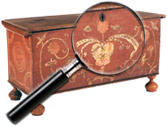|
|
Wagner Hollow Ware & Manufacturing Company
The Wagner Hollow Ware Company was founded in 1881 by Bernard and Milton Wagner in Sidney, Ohio. Initial casting efforts included hardware and hollow tin ware. Cast iron Wagner Ware cookware was introduced shortly after start-up. In 1891 the company evolved into the Wagner Manufacturing Company and aluminum cookware was introduced.
Wagner continued expansion in the 20th century with the introduction of Magnalite metal alloy cookware in [...] Click here to continue reading.
Collection of Dr. Arthur M. Sackler
Dr. Arthur M. Sackler was one of America’s most important philanthropists and ardent art collectors. His passion for objects transcended any one category or time period, describing his own interest in art as “a long journey, a spiritual pilgrimage from my roots in the Western arts, a hegira which carried me to the aesthetics of the East.” In a collection that spanned genres from European terracotta and bronze [...] Click here to continue reading.
The Creations Company
The Creations Company (Lancaster, Pennsylvania, circa 1930), maker of cast iron doorstops and other decorative cast iron objects before falling victim to the Stock Market crash and Great Depression.
Roycroft – New York Arts & Crafts Community
After visiting William Morris’s Kelmscott community of artisans, charismatic businessman and writer Elbert Hubbard (1856 to 1915) embarked on his own version in East Aurora, New York. His Roycroft community, America’s only Arts & Crafts campus, began in 1895 as a high quality leather bookbindery and publishing house. The name came from two 17th century London printers. The community’s large and prominently displayed mark, the orb [...] Click here to continue reading.
Toupie Feet
Derived from the French word for top (as in a child’s toy spinning top), toupie feet are turned top-shaped forms having a larger turning in the middle, narrowing to a small radius turning at the bottom which forms the foot.
Reference note by p4A editorial staff, 05.09.
Hubley Banks & Toys
Hubley Manufacturing Company began operation in 1894 and was located in Lancaster, Pennsylvania. They expanded their basic line of toys in the 1920s to include bookends, ashtrays, and doorstops.
Unlike most other companies who produced toys and banks as a profitable sidelines to their hardware manufacturing, John Hubley, the founder of the Hubley Manufacturing Company, emphasized toy and bank manufacturing from the very beginning. The company used the patterns of [...] Click here to continue reading.
Georgian Furniture
Georgian furniture refers to the evolution of styles popular during the reigns of the Hanoverian monarchs George I, II and III in 18th-century England. The period was one of remarkable prosperity and stability, and the decorative arts reflect this settled time. Thomas Chippendale, Robert Adam, Thomas Sheraton and George Hepplewhite are all 18th-century British designers whose pattern books became popular not only in England, but around the world, most notably in the [...] Click here to continue reading.
Cast Iron Sugar Kettles
The cast iron sugar kettle is not the familiar tea kettle shape with a lid, spout and carrying handle. Instead it is generally bowl-shaped, often with a projecting lip, made in a variety of dimensions from about three feet to the largest, seven or eight feet across. Although kettles were cast locally in the south, many were shipped from the more industrialized centers in the eastern and midwestern states in [...] Click here to continue reading.
The Griswold Manufacturing Company
The Griswold Manufacturing Company of Erie, Pennsylvania, circa 1865 to 1960. Makers of cast iron kitchen and home implements including cookware and hardware. Purchased by Wagner Manufacturing of Sidney, Ohio in 1957.
Notes on marks. Griswold’s early cookware was plainly marked Erie together with a number and or part number. The Griswold circle and cross trademark was patented and introduced circa 1909 with Griswold impressed in slanted text. The ‘block’ [...] Click here to continue reading.
Right Bank, Left Bank
The chateaus Cheval Blanc and Petrus are two pillars of the “Right Bank”. This reference stems from the Bordeaux region being intersected by three rivers. The “right bank” of the Dordogne River is where the villages of St. Emillion and Pomerol are situated. Further to the north and west on the “left bank” of the Gironde River one finds towns such as Pauillac, Margaux and St. Julien. Right Bank wines [...] Click here to continue reading.
|
Recent Articles
- Charles Alfred Meurer – American Artist & Tromp L’Oeil Artist
- Sendak, Maurice – American Artist & Writer
- Godie, Lee – American Artist
- Davis, Vestie – American Artist
- Bartlett, Morton – American Artist
- Mackintosh, Dwight – American Artist
- Evans, Minnie Jones – African-American Artist
- Mumma, Ed (Mr. Eddy) – American Artist
- Nice, Don – American Artist
- Savitsky, John (Jack) – American Artist
- Gordon, Harold Theodore (Ted) – American Artist
- Dial, Thornton – African-American Artist
- Doyle Sam – American Artist
- Johnson, Lester Frederick – American Artist
- Finster, Howard – American Artist
|
|
